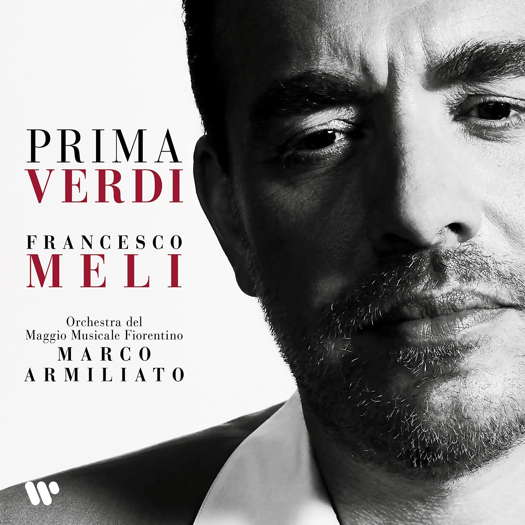 SPONSORED: DVD Spotlight. Olympic Scale - Charles Gounod's Roméo et Juliette, reviewed by Robert Anderson.
SPONSORED: DVD Spotlight. Olympic Scale - Charles Gounod's Roméo et Juliette, reviewed by Robert Anderson.
All sponsored features >>

A Verdi Avenue
GIUSEPPE PENNISI listens to Francesco Meli
'... a demonstration of Meli's ability but also of his genuine love for Verdi ...'
I have known Francesco Meli - today considered one of Verdi's greatest tenors in Italy and abroad - since he began his career as a Rossini (at the Rossini Opera Festival) and Mozart light tenor (at La Scala) that is, since he began a belcanto career at a very young age. I got to listen to him as he, sagaciously managing his own voice, took on 'absolute tenor' roles - for example, in Massenet's Werther at the Teatro Regio di Parma. I also had the fortune to be invited by conductor Michele Mariotti to sit at a table of the Donatello Restaurant in Bologna (a few steps from the Teatro Comunale, where a Sunday daytime performance of Mozart's Idomeneo was scheduled) with Meli and his wife, the soprano Serena Gamberoni. I first encountered and appreciated the Meli 'Verdian' approach when Riccardo Muti conducted three or four operas a year at Teatro dell'Opera in Rome. Muti had discovered Meli when he was only twenty-three years old: he had made his debut at La Scala in a role distant from belcanto in Francis Poulenc's Dialogues des Carmélites.
The CD Prima Verdi is Meli's first monographic album. He already has, in his catalogue, roles on many CDs and DVDs of works by a wide range of composers: there is also a very beautiful edition accompanied by essays of the level of that initial Dialogues des Carmélites I just mentioned. This CD is not a collection of recordings already made but a studio recording - now they are a rarity - made with the orchestra of the Maggio Musicale Fiorentino, one of Italy's best, conducted by Marco Armiliato. It is, in the first place, Meli's declaration of love towards Verdi, where he arrived after a career in Rossini and Mozart roles. It is, then, a demonstration that Meli is in full vocal maturity.
The CD program is conceived in chronological order: from I Lombardi alla prima crociata, a work of the early Verdi period in which the tenor is still given belcanto inflections to Otello, the first true Italian musikdrama which tenors usually face almost at the end of their careers due to the vocal difficulties that the role entails.
In the first two pieces (from I Lombardi alla prima crociata and from I due Foscari), we note his ability to face with mastery a very high texture with belcanto echoes.
Listen — Verdi: Notte! Perpetua notte che qui regni! (I due Foscari Act II)
(5054197115455 track 2, 1:56-2:49) ℗ 2021 Francesco Meli :
The two pieces from Macbeth and La battaglia di Legnano reflect what I would call 'the Verdi of the ring': from an almost central register rings do start; these were once attributed the ability to 'shake the chandelier of the theatre'.
Listen — Verdi: Oh! fede negar potessi agl'occhi miei! (Luisa Miller Act II)
(5054197115455 track 5, 0:00-0:58) ℗ 2021 Francesco Meli :
This characteristic is taken up in the finale of the aria of the third act of Il Trovatore and in 'Celeste Aida'.
Listen — Verdi: Celeste Aida (Aida Act I)
(5054197115455 track 10, 1:21-2:13) ℗ 2021 Francesco Meli :
'Quando le sera al placido' from Luisa Miller is very sweet and the legato of 'Sento avvampar nell'anima' from Simon Boccanegra, as well as the arias from Un ballo in maschera and La forza del destino are fascinating.
I do not know if Meli ever sang the complete Otello live. He performed Act IV in October 2019 at a Verdi gala in Piacenza. 'Niun mi tema', the last track of the CD, is beautiful and enthralling. It is admirable that he coped with it at a relatively young age - about forty.
Listen — Verdi: Dio! mi potevi scagliar tutti i mali (Otello Act III)
(5054197115455 track 11, 3:31-4:19) ℗ 2021 Francesco Meli :
Phrasing is the decisive element of Meli's Verdian style. He has grasped how the problem of this vocality, once the technique has been arranged, consists precisely in declaiming the word. The examples offered on the CD are countless. As Meli phrases 'Ah sì ben mio nell'essere' or 'Ma se m'è forza perderti', the listener understands that these are the premises of the success of 'Niun mi tema'. It is realized precisely by virtue of the meaning of the phrasing, of the Verdi accent that Meli has matured. Thus, from sentence to sentence, Otello's farewell takes consistency and acquires that dignity that the Moor must have at the moment when he kills himself.
In short, this CD is not only a demonstration of Meli's ability but also of his genuine love for Verdi, but also an avenue to understand and appreciate the composer.
Copyright © 4 April 2022
Giuseppe Pennisi,
Rome, Italy

CD INFORMATION: PRIMA VERDI - FRANCESCO MELI
ARTICLES ABOUT THE MAGGIO MUSICALE FIORENTINO



